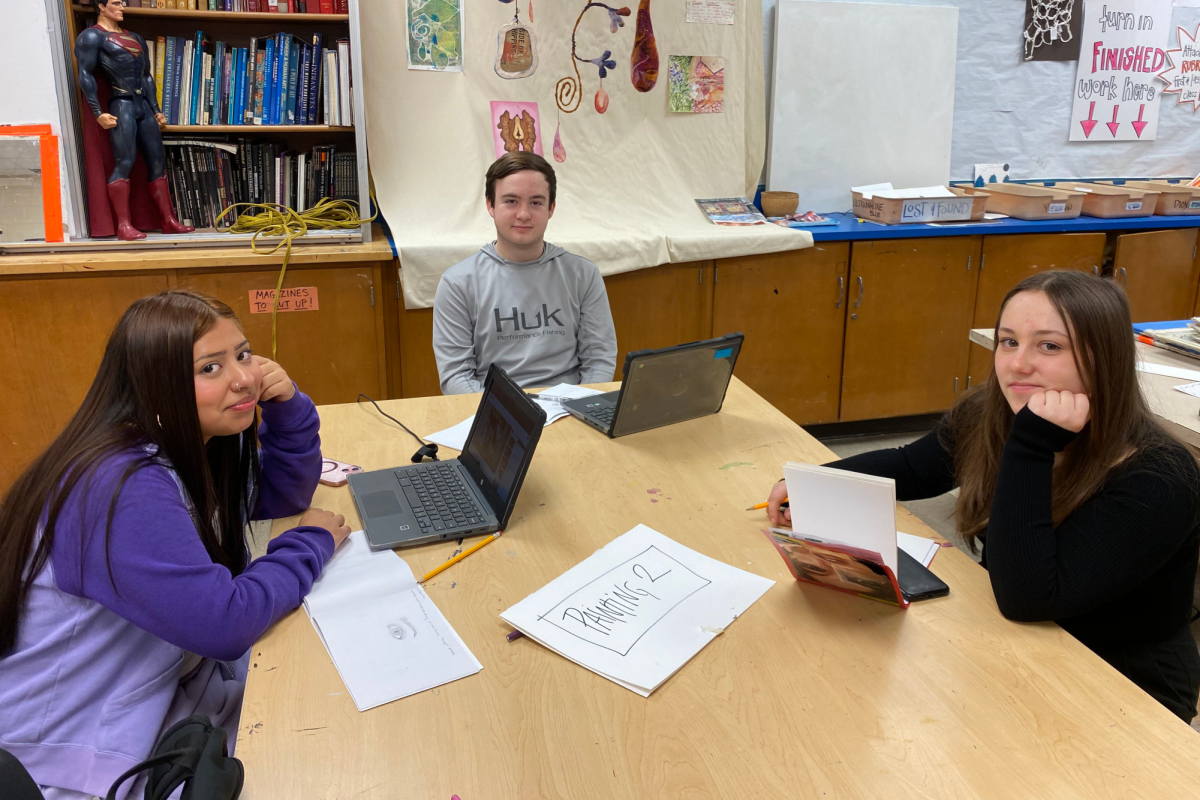Pop on the telly here in the states and you’ll see buff half-plastic orange people fighting over superficial things, celebrities getting married and divorced in record time, rags-to-riches auditions of various performances, and stupid people doing stupid things caught on camera.
However, things are starting to creep in from across the pond — whether it be Benedict Cumberbatch facing off against Andrew Scott in Sherlock, Maggie Smith supplying wartime comic relief in Downton Abbey, or even the famously mysterious Stig in Top Gear — the British are coming, bruv, and they aren’t going to be leaving any time soon.
But what’s so bloody appealing about it all?
“They take risks with much more,” said senior Lucy Pipkin. “They’re not afraid to use smart dialogue. They’re not all about typical nuclear families with stereotypical problems… I definitely like British television more than American television.”
Pipkin is an avid watcher of British television: her repertoire ranges from Skins to Sherlock.
“Misfits is fantastic, and Downton Abbey is a soap opera – but it’s British, so it seems classy!” noted Pipkin, who lists people like Benedict Cumberbatch, Carey Mulligan, and Maggie Smith as her favorite actors.
“Maggie Smith is the best actress on Downton Abbey, by far,” said junior Greta Hagedorn. “I mean, all these shows she’s in, there’s these great one-liners and every time she’s in a scene, you know it’s going to be funny.”
Hagedorn, also an avid watcher of British television, follows modern BBC shows such as Sherlock and Downton Abbey, but also is a seasoned veteran when it comes to older programs like The Glittering Prizes and Ballykissangel, which debuted in 1976 and 1996, respectively.
“I think in our generation, the obsession with all things British started with Harry Potter,” noted Hagedorn. “Not many teenagers I know are super-interested in British television, but I know that show, Skins, was really popular. I think the sort-of obsession with Downton Abbey has to do with the “Midnight in Paris” phenomenon, of wanting to be back in the past, and see that era… As much as those [economic] classes were oppressive and everything, people want that back, which is kind of funny because there’s been a lot of progress in the last century.”
Downton Abbey debuted on the United Kingdom’s ITV channel in late 2010, and less than six months later, popped up across the pond on PBS. These days, along with Downton Abbey, the modern Sherlock adaptation of Sir Arthur Conan Doyle’s famous works — which faced similar timing to Downton — has arguably started to take the reigns of American viewers by storm.
Since its debut, Downton has raked in 15 awards for anything ranging from its cast’s performances to writing, along with several other nominations. Sherlock also took in similar awards and recognitions, as well as starting fashion crazes over lead actor Benedict Cumberbatch’s wool trenchcoat, which was thrown back into mass-production after supply-and-demand took its toll on the fanbase.
However, it goes without saying that such success can’t stand with all shows – especially when those shows get remade by Americans.
“First of all, the American version [of Skins] is not half as good as the British one,” retorted Pipkin. “It just seems a little more superficial. MTV glorified it more than they needed to.”
“In general, I don’t think American remakes are as good as the original,” added Hagedorn. “I like the modern look at Sherlock Holmes, but I think the American version is just so special effects-heavy that it looks past what Sherlock himself is all about – just Sherlock in his mind, rather than just some big chase scene. That’s not really how the books are.”
No matter the quality or quantity of British television, there is one universal problem that hits all of the non-British viewers where it hurts — right in the chronological cortex. In layman’s terms: things are released in the UK before they are in the released in the US, causing problems with when fans can watch their favorite programs, and how.
“I watched Sherlock illegally on a Russian website,” laughed Hagedorn. “But I’m reluctant to watch them before they’re here in America, now… I think it’s more fun for me to watch them on TV, because you have to wait all week and have something to look forward to, whereas I have friends at Southwest and they’ve already watched season two, so then I’m like ‘Come on, what do you have to look forward to?’”
“I don’t usually go outside the law,” added Hagedorn. “Unless I have to, if it’s not on Instant Netflix, well… I don’t have Instant Netflix anymore, so I guess, if I don’t have access to it, I’ll go find it on some bad site.”
That doesn’t mean you necessarily have to watch your British television on websites with advertisements telling you how to lose thirty pounds in three easy steps, though. Good things come to those who wait, but if you can’t wait to see what Moriarty does next, then it’s entirely up to you how you want to find out.
“The stereotype for British TV is that its for old people,” concluded Hagedorn. “But that’s not true. There’s actually plenty of young people that watch these shows — some don’t want to admit it, they’re actually sort of secret about it.”






